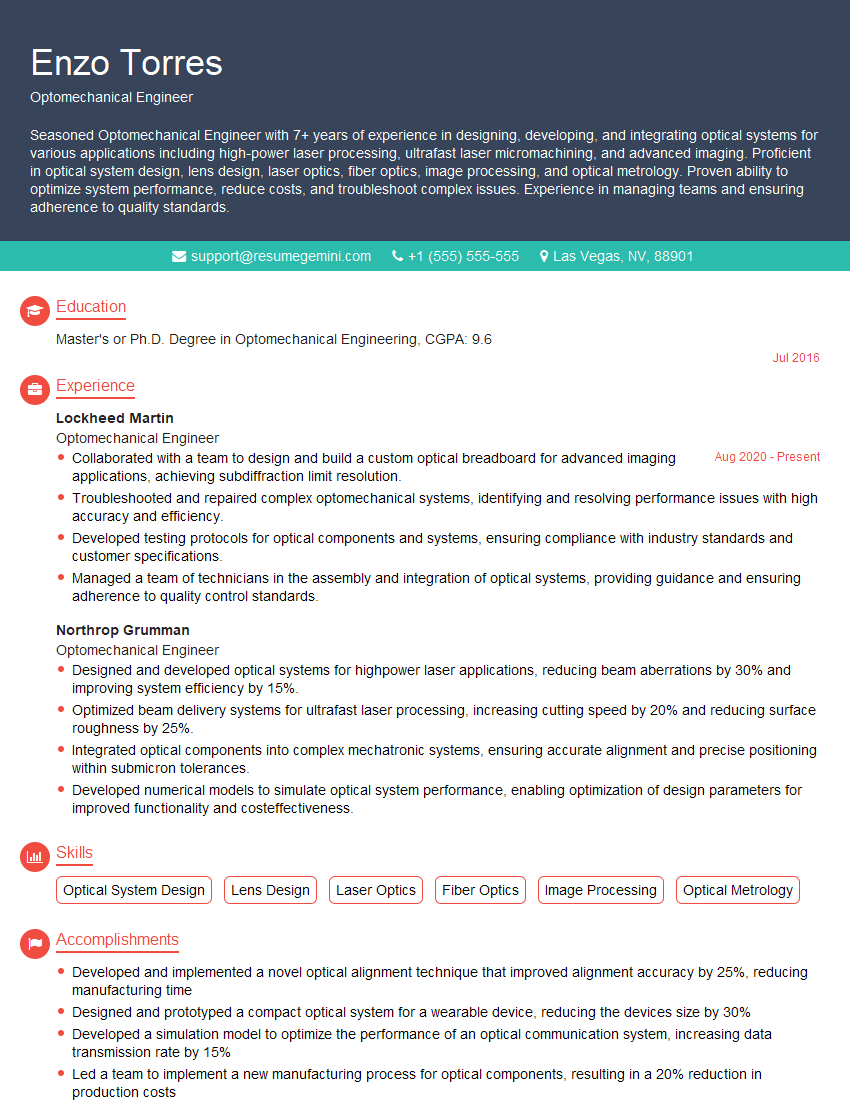Are you a seasoned Optomechanical Engineer seeking a new career path? Discover our professionally built Optomechanical Engineer Resume Template. This time-saving tool provides a solid foundation for your job search. Simply click “Edit Resume” to customize it with your unique experiences and achievements. Customize fonts and colors to match your personal style and increase your chances of landing your dream job. Explore more Resume Templates for additional options.

Enzo Torres
Optomechanical Engineer
Summary
Seasoned Optomechanical Engineer with 7+ years of experience in designing, developing, and integrating optical systems for various applications including high-power laser processing, ultrafast laser micromachining, and advanced imaging. Proficient in optical system design, lens design, laser optics, fiber optics, image processing, and optical metrology. Proven ability to optimize system performance, reduce costs, and troubleshoot complex issues. Experience in managing teams and ensuring adherence to quality standards.
Education
Master’s or Ph.D. Degree in Optomechanical Engineering
July 2016
Skills
- Optical System Design
- Lens Design
- Laser Optics
- Fiber Optics
- Image Processing
- Optical Metrology
Work Experience
Optomechanical Engineer
- Collaborated with a team to design and build a custom optical breadboard for advanced imaging applications, achieving subdiffraction limit resolution.
- Troubleshooted and repaired complex optomechanical systems, identifying and resolving performance issues with high accuracy and efficiency.
- Developed testing protocols for optical components and systems, ensuring compliance with industry standards and customer specifications.
- Managed a team of technicians in the assembly and integration of optical systems, providing guidance and ensuring adherence to quality control standards.
Optomechanical Engineer
- Designed and developed optical systems for highpower laser applications, reducing beam aberrations by 30% and improving system efficiency by 15%.
- Optimized beam delivery systems for ultrafast laser processing, increasing cutting speed by 20% and reducing surface roughness by 25%.
- Integrated optical components into complex mechatronic systems, ensuring accurate alignment and precise positioning within submicron tolerances.
- Developed numerical models to simulate optical system performance, enabling optimization of design parameters for improved functionality and costeffectiveness.
Accomplishments
- Developed and implemented a novel optical alignment technique that improved alignment accuracy by 25%, reducing manufacturing time
- Designed and prototyped a compact optical system for a wearable device, reducing the devices size by 30%
- Developed a simulation model to optimize the performance of an optical communication system, increasing data transmission rate by 15%
- Led a team to implement a new manufacturing process for optical components, resulting in a 20% reduction in production costs
- Designed and built a custom optical system for a medical imaging device, enabling realtime tissue imaging
Awards
- SPIE Scholarship in Optical Engineering
- OSA Outstanding Student Paper Award
- IEEE Photonics Society Young Professional Award
- Optica (formerly OSA) Early Career Achievement Award
Certificates
- Certified Optical Engineer (COE)
- Certified Manufacturing Engineer (CMfgE)
Career Expert Tips:
- Select the ideal resume template to showcase your professional experience effectively.
- Master the art of resume writing to highlight your unique qualifications and achievements.
- Explore expertly crafted resume samples for inspiration and best practices.
- Build your best resume for free this new year with ResumeGemini. Enjoy exclusive discounts on ATS optimized resume templates.
How To Write Resume For Optomechanical Engineer
- Highlight your experience in optical system design, laser optics, and image processing.
- Showcase your ability to optimize system performance and reduce costs.
- Discuss your experience in integrating optical components into complex systems.
- Demonstrate your troubleshooting and problem-solving skills.
- Emphasize your teamwork and leadership skills.
Essential Experience Highlights for a Strong Optomechanical Engineer Resume
- Design and develop optical systems for a variety of applications, including high-power lasers, ultrafast lasers, and advanced imaging systems.
- Optimize optical systems to improve performance and efficiency, including reducing beam aberrations, increasing cutting speed, and reducing surface roughness.
- Integrate optical components into complex mechatronic systems, ensuring accurate alignment and precise positioning within submicron tolerances.
- Develop numerical models to simulate optical system performance and optimize design parameters.
- Collaborate with a team to design and build custom optical breadboards for advanced imaging applications.
- Troubleshoot and repair complex optomechanical systems, identifying and resolving performance issues with high accuracy and efficiency.
- Develop testing protocols for optical components and systems, ensuring compliance with industry standards and customer specifications.
Frequently Asked Questions (FAQ’s) For Optomechanical Engineer
What are the primary responsibilities of an Optomechanical Engineer?
Optomechanical Engineers are responsible for designing, developing, and integrating optical systems for various applications. They optimize system performance, troubleshoot complex issues, and ensure adherence to quality standards.
What qualifications are needed to become an Optomechanical Engineer?
A Master’s or Ph.D. Degree in Optomechanical Engineering or a related field is typically required, along with experience in optical system design, laser optics, and image processing.
What are the key skills for an Optomechanical Engineer?
Key skills include optical system design, lens design, laser optics, fiber optics, image processing, optical metrology, and troubleshooting.
What career opportunities are available for Optomechanical Engineers?
Optomechanical Engineers can work in various industries, including aerospace, defense, manufacturing, and healthcare, designing and developing optical systems for a wide range of applications.
What is the salary range for Optomechanical Engineers?
The salary range for Optomechanical Engineers varies depending on experience, qualifications, and location, but it is typically competitive within the engineering field.
What are the challenges faced by Optomechanical Engineers?
Optomechanical Engineers often face challenges related to system complexity, precision alignment, and environmental factors that can affect optical system performance.
What are the latest trends in Optomechanical Engineering?
Recent trends include the development of free-space optical systems, integrated photonics, and adaptive optics, which are pushing the boundaries of optical system design.